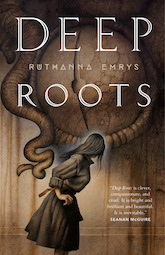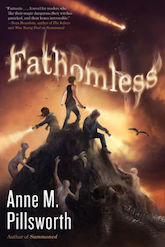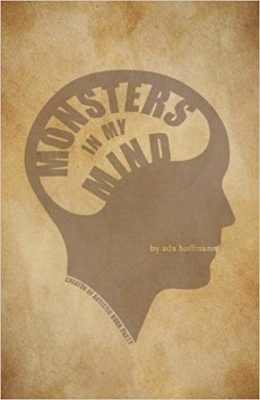Welcome back to the Lovecraft reread, in which two modern Mythos writers get girl cooties all over old Howard’s sandbox, from those who inspired him to those who were inspired in turn.
This week, we’re reading Ada Hoffman’s “The Mother of All Squid Builds a Library,” first published in December 2013 in Strange Horizons and later collected in Hoffman’s Monsters in My Mind. Spoilers ahead.
[Since today’s story is shorter than our usual summary, why not just read it in all its undersea glory now? You won’t regret it!]
“In the Fourth Year of the Hydra, the Mother of All Squid built a library.”
Summary
The Mother of All Squid, having heard from the whales of splendid upper world libraries, decides to build her own. She sends fifteen of her bodies to the whales, asking for contributions, but they scoff — libraries belong to the sun and air, not the dark wet deep, where books will soak and rot unread. Adding injury to insult, they eat two of her bodies and leave without so much as a thank you. But the Mother knows she can build a library her own way.
Six thousand of her bodies construct the walls from clamshells and stone. Of all the species who speak with light, the flame-eels are brightest; the Mother persuades several to “contribute” to her library. The volunteers parade library-ward decked in trains of bone and sand, praised in song and light by the other eels. There, while each volunteer glows something important, the tale of ancient war or a lullaby or the passion of courtship, the Mother flays them with her tentacle-barbs and stretches their skin on the library wall. All the messages are clear and beautiful. Flame-eels travel for miles to marvel.
Even when the Mother’s library has eel-skin “books” on everything from family sagas to cell biology, the whales remain skeptical. They boast that they themselves need no libraries since they sing the finest songs in the ocean.
Ah, sighs the Mother. If only her library had such a song. She plays upon the pride of the whales until one small male, renowned for his songs, stays behind to help her. The Mother bids him sing until she memorizes every note. Then, she hooks barbs into the whale’s skin, saying kindly, “This might hurt a little.”
The Mother arranges corals under the whale’s skin, so water may whistle through them. She tunes every note, deepens timbre, amplifies peals. The whales return, expecting nothing. Instead they’re amazed by the mournful, beautiful song that pours from the “book” their old companion’s become. It’s him, they admit. The Mother’s made him immortal.
Now if you ask the whales, they’ll tell you the Mother has made her library well, and every few years another whale swims down never to return, and his song is heard across the sea forever.
What’s Cyclopean: The library, we presume. Or at least, it requires 6000 squid bodies to complete, so “cyclopean” seems like a better bet than “gambrelled.”
The Degenerate Dutch: Whales are extremely dismissive of squid, despite the fact that they do make tasty snacks.
Mythos Making: Anything with tentacles is automatically part of the Lovecraftian club. Tentacles + rare and deadly books gets in for free.
Libronomicon: You’ve heard of books bound in human skin…
Madness Takes Its Toll: These whales are just waiting to laugh at someone at the academy.
Buy the Book


Deep Roots
Ruthanna’s Commentary
I’m a hard sell on human (sapient) sacrifice. One can’t help feeling a certain dismissiveness of any entity who requires something as pedestrian as blood and hearts to get by. First you tell me that you’re from a dimension beyond my understanding, and then you explain your iron deficiency? Try again.
On the flip side—when an author does manage to sell me on sacrifice, it can work extraordinarily well. “All Our Salt-Bottled Hearts” makes it work by keeping the sacrifice distant and numinous, focusing more on the spiritual meaning it holds for the characters than on any clear-eyed view of the garlands and the knife. Others have some practical, mortal reason for sacrifice: scientific research, like the “sacrifice” of lab rats, or the prices that other races pay for the Yith’s preservation of knowledge.
“The Mother of All Squid” succeeds gloriously on that last justification—the sacrifice of a mere, mortal life in exchange for legacy. Wordfame, the immortality of poets, has driven people to far more desperate ends. Even whales, who don’t normally go in for that sort of thing.
The Mother has a bit of Yith in her, too. After all, while her own bodies do get eaten sometimes, she doesn’t sacrifice them directly to the library, reserving that honor for other creatures. Squid skin is fairly expressive, although presumably she already knows everything it has to say. She’s an intriguing creature—is she in fact the hive mind of all squid, or some sort of cephalopodic demigod, with other single-bodied squid benefiting from her protection and curration?
She has a trickster’s ability to talk people into improbable things. And while she’s not only a trickster, the story does track the form of many tales in which coyote or Anansi creates some fabulous aspect of the world in the process of such persuasion, with a certain amount of blood on the way. The world needs more trickster librarians, I think. The Mythos in particular could use a few trickster librarians, just to make sure those forbidden tomes don’t stay hidden forever.
And though the Library’s creation is poetic and bloody, it does celebrate the full range of stories that are worth preserving and sharing. It’s not too surprising to find eel-bound stories of passionate courtship and ancient wars in the Mother’s stacks. But we’re also told that she has treatises (plural!) on cell biology. Scientists die for their research as often as poets for their stanzas, and it’s good to know these things are equally valued in the depths of the Marianas Trench. Charles Dexter Ward and Violet Carver would understand.
Given the folktale form, and the implication of some larger myth-set, I now really want to read the rest of that set. The Mother of All Squid Tames the Anglerfish. The Whale-Bard Sings Down a Shipwreck. How the Flame-Eels Stole Sunlight From the Sharks. (It’s a fable about the creation of bioluminescence. Obviously.)
“Works in salt water” is supposed to be one of the most challenging requirements in engineering. It’s also true of library science—and I’m delighted and impressed by this contribution to the literature.
Buy the Book


Fathomless
Anne’s Commentary
A few sentences into this week’s story I heard it, like Pan’s pipes in the reeds, like cetacean song echoed across an ocean shore to shore, that unmistakable lilt and cadence and confidence of the ur-storyteller’s voice. The one at home in the places a step or a few thousand beyond the listeners’ everyday lives. Like our Howard’s Dreamlands, for example. Or like the Magic Mirror-World of the Anthropomorphized. Also known as the fable, in which animals get to play us humans and so (not infrequently) to make moral points. Sometimes exaggerated ones. Howard wasn’t big on fables. Maybe half-fables, if you count the cats of Ulthar, which are anthropomorphized in the most feline of manners. But what are his morals? Don’t be mean to cats? Elsewise, don’t mess with old stuff you don’t understand? Exactly. Tomes are right out. Also, when in doubt, run. Maybe when not in doubt, run. Or stay home in the first place. Definitely DO NOT GO UNDERGROUND OR INTO RUINS OR OLD HOUSES.
All good rules to live by.
Hoffmann’s “Mother of All Squid,” on the other hand, is classic fable: short in length, with all animal characters sporting human characteristics, and with the clear moral lesson that —
Um.
The first time I read it, I was swept along by the storyteller’s humor and deft economy of detail (so much richness in such a small space!) I also took a sucker-punch to a weak spot in my emotional defenses. Oh hell, immortality, yeah. And immortality through art! The eternal flame-eel light show! The forever-resonation of whale song! You wonderful Mother of Squid, to build such a library, of a visceral power beyond any other. Beyond any human library, beyond any Yith archival hoard of cosmic history, for what are those but words? Words, words, words.
Oh brave eels, oh brave whales, oh Mother of marvels!
I think I’m going to cry, it’s just so beautiful….
But then I read the story again. And this time I’m, like, wait a minute. Howard, let’s put our heads together. Could immortality have too high a price? Oh, physical immortality, sure. Look at all the fuss Joseph Curwen had to go through, and that Dr. West put his subjects through, and all Dr. Munoz’s ice-baths. What about artistic immortality? Intellectual immortality? Well, Howard seems to muse. The Yith didn’t seem to think living through their archives was quite enough. They didn’t mind switching bodies, but mind-death, nope, forget about it.
So I thought some more. And the thought came to me, or rather the old academic saw: Publish or perish. Except where the Mother is concerned, isn’t it Perish and then publish?
Yes, so it is. In her library, all the authors are posthumous. One tough editor, she makes sure of that herself. Hoffmann is as sly as Mother, the way she beguiles us with the pageant of the flame-eels’ parade and praise-singing, then slips in that little bit about how Mother ever so precisely flays each eel alive as it tells its important story, the story to be preserved in shifting light on its skin! Hooks ‘em with the barbs in her tentacles! Carefully auditions the first whale victim, er, volume, before hooking him and remarking (kindly!) that this might hurt a bit!
Mother’s going to build a library her own way, all right. She’s not a sadist or murderer or anything, either. All her victims, er, volumes are volunteers.
Guys! Is artistic immortality worth it? Is any immortality you’ve got to take on faith? Sly Hoffmann again, how she slips in that bit about how the flame-eels urge on their volunteers with wishes they’ll have all the dragonfish they can swallow in the afterworld. Seems I’ve heard other people besides flame-eels promise their followers elaborate afterworld rewards for suicide….
I don’t know. Perish and publish. I guess there’d be some advantages. Your family could get any royalties. And you wouldn’t have to see any bad reviews. It would be a bad thing for those of us who love long novels, however, because who could endure Mother’s flaying past page 200? The flame-eel with the war story only got halfway through, remember. And forget about series, unless each book were by a fresh victim, er, sorry keep slipping there, author.
Mother? Do you think you could take just a skin sample, say, an inch square or so? I think a library with mosaic walls would be simply fabulous.
Next week, the many-towered city of Zeth encounters some financial challenges in Lovecraft and Barlow’s “Hoard of the Wizard-Beast.”
Ruthanna Emrys is the author of the Innsmouth Legacy series, including Winter Tide and Deep Roots. Her neo-Lovecraftian stories “The Litany of Earth” and “Those Who Watch” are available on Tor.com, along with the distinctly non-Lovecraftian “Seven Commentaries on an Imperfect Land” and “The Deepest Rift.” Ruthanna can frequently be found online on Twitter and Dreamwidth, and offline in a mysterious manor house with her large, chaotic household—mostly mammalian—outside Washington DC.
Anne M. Pillsworth’s short story “The Madonna of the Abattoir” appears on Tor.com. Her young adult Mythos novel, Summoned, is available from Tor Teen along with sequel Fathomless. She lives in Edgewood, a Victorian trolley car suburb of Providence, Rhode Island, uncomfortably near Joseph Curwen’s underground laboratory.










